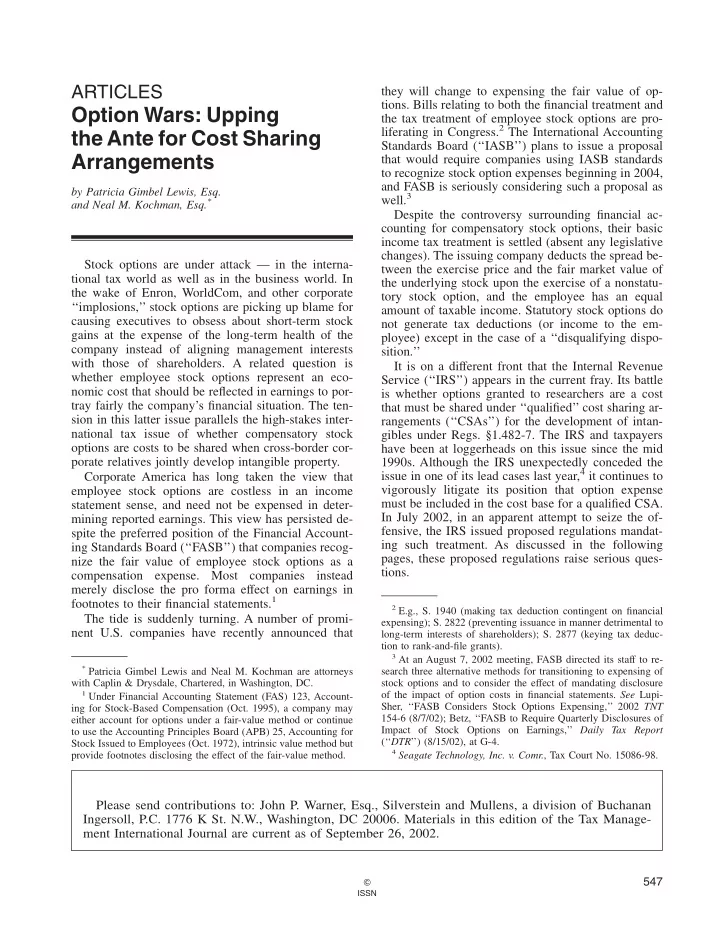

ARTICLES they will change to expensing the fair value of op- tions. Bills relating to both the financial treatment and Option Wars: Upping the tax treatment of employee stock options are pro- liferating in Congress. 2 The International Accounting the Ante for Cost Sharing Standards Board (‘‘IASB’’) plans to issue a proposal Arrangements that would require companies using IASB standards to recognize stock option expenses beginning in 2004, and FASB is seriously considering such a proposal as by Patricia Gimbel Lewis, Esq. well. 3 and Neal M. Kochman, Esq. * Despite the controversy surrounding financial ac- counting for compensatory stock options, their basic income tax treatment is settled (absent any legislative changes). The issuing company deducts the spread be- Stock options are under attack — in the interna- tween the exercise price and the fair market value of tional tax world as well as in the business world. In the underlying stock upon the exercise of a nonstatu- the wake of Enron, WorldCom, and other corporate tory stock option, and the employee has an equal ‘‘implosions,’’ stock options are picking up blame for amount of taxable income. Statutory stock options do causing executives to obsess about short-term stock not generate tax deductions (or income to the em- gains at the expense of the long-term health of the ployee) except in the case of a ‘‘disqualifying dispo- company instead of aligning management interests sition.’’ with those of shareholders. A related question is It is on a different front that the Internal Revenue whether employee stock options represent an eco- Service (‘‘IRS’’) appears in the current fray. Its battle nomic cost that should be reflected in earnings to por- is whether options granted to researchers are a cost tray fairly the company’s financial situation. The ten- that must be shared under ‘‘qualified’’ cost sharing ar- sion in this latter issue parallels the high-stakes inter- rangements (‘‘CSAs’’) for the development of intan- national tax issue of whether compensatory stock gibles under Regs. §1.482-7. The IRS and taxpayers options are costs to be shared when cross-border cor- have been at loggerheads on this issue since the mid porate relatives jointly develop intangible property. 1990s. Although the IRS unexpectedly conceded the issue in one of its lead cases last year, 4 it continues to Corporate America has long taken the view that vigorously litigate its position that option expense employee stock options are costless in an income must be included in the cost base for a qualified CSA. statement sense, and need not be expensed in deter- In July 2002, in an apparent attempt to seize the of- mining reported earnings. This view has persisted de- fensive, the IRS issued proposed regulations mandat- spite the preferred position of the Financial Account- ing such treatment. As discussed in the following ing Standards Board (‘‘FASB’’) that companies recog- pages, these proposed regulations raise serious ques- nize the fair value of employee stock options as a tions. compensation expense. Most companies instead merely disclose the pro forma effect on earnings in footnotes to their financial statements. 1 2 E.g., S. 1940 (making tax deduction contingent on financial The tide is suddenly turning. A number of promi- expensing); S. 2822 (preventing issuance in manner detrimental to nent U.S. companies have recently announced that long-term interests of shareholders); S. 2877 (keying tax deduc- tion to rank-and-file grants). 3 At an August 7, 2002 meeting, FASB directed its staff to re- * Patricia Gimbel Lewis and Neal M. Kochman are attorneys search three alternative methods for transitioning to expensing of with Caplin & Drysdale, Chartered, in Washington, DC. stock options and to consider the effect of mandating disclosure 1 Under Financial Accounting Statement (FAS) 123, Account- of the impact of option costs in financial statements. See Lupi- Sher, ‘‘FASB Considers Stock Options Expensing,’’ 2002 TNT ing for Stock-Based Compensation (Oct. 1995), a company may 154-6 (8/7/02); Betz, ‘‘FASB to Require Quarterly Disclosures of either account for options under a fair-value method or continue Impact of Stock Options on Earnings,’’ Daily Tax Report to use the Accounting Principles Board (APB) 25, Accounting for (‘‘ DTR ’’) (8/15/02), at G-4. Stock Issued to Employees (Oct. 1972), intrinsic value method but 4 Seagate Technology, Inc. v. Comr. , Tax Court No. 15086-98. provide footnotes disclosing the effect of the fair-value method. Please send contributions to: John P. Warner, Esq., Silverstein and Mullens, a division of Buchanan Ingersoll, P.C. 1776 K St. N.W., Washington, DC 20006. Materials in this edition of the Tax Manage- ment International Journal are current as of September 26, 2002. 547 � ISSN
Recommend
More recommend